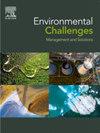The nexus among employees’ green concerns, green effectiveness, and green behavior through mediating role of employees’ green knowledge: Evidence from Bangladeshi consumer goods industry
Q2 Environmental Science
引用次数: 0
Abstract
The rapid growth of industrialization continuously creates challenges for the global environment, necessitating conscious and sustainable behavior across businesses to lessen their impacts. The Knowledge-Attitude-Behavior (KAB) model and Self-Efficacy Theory motivated the study. KAB indicates that Knowledge influences Attitude and Attitude influences Behavior and Self-Efficacy implies that self-confidence in capabilities leads to improved actions. This study aims to investigate the impacts of employee green concerns and green effectiveness on green behavior identifying the mediation effect of environmental knowledge of employees through a study on 261 workers and managers of the consumer goods industry in Bangladesh. The data were collected using a 20-item 5-point Likert scale structured questionnaire by adopting a purposive sampling method. Microsoft Excel was used to prepare the data for analysis, IBM SPSS 25 was used to assess the multicollinearity issues, and Smart PLS 4.0 was used to analyze the measurement model to assess the reliability and validity of the constructs while the structural model was used to test the hypotheses of this study. The results indicate noteworthy direct effects of employees’ green concerns and green effectiveness as well as significant indirect effects of Employees’ Green Knowledge as a mediator on employee green behavior. Managers can enhance employees' green knowledge to foster environmental awareness, boost self-confidence in their abilities, and ultimately promote green behavior in the workplace.
员工绿色知识对员工绿色关注、绿色效能和绿色行为的中介作用:来自孟加拉消费品行业的证据
工业化的快速发展不断给全球环境带来挑战,需要企业有意识和可持续的行为来减少其影响。知识-态度-行为(Knowledge-Attitude-Behavior, KAB)模型和自我效能理论是本研究的动机。KAB表明知识影响态度,态度影响行为,自我效能表明对能力的自信导致行为的改进。本研究旨在通过对孟加拉国消费品行业261名工人和管理人员的研究,探讨员工绿色关注和绿色有效性对绿色行为的影响,并确定员工环境知识的中介作用。采用有目的抽样法,采用20项5分Likert量表的结构化问卷进行数据收集。使用Microsoft Excel准备数据进行分析,使用IBM SPSS 25评估多重共线性问题,使用Smart PLS 4.0分析测量模型来评估结构的信度和效度,使用结构模型来检验本研究的假设。结果表明,员工绿色关注和绿色效能对员工绿色行为有显著的直接影响,员工绿色知识对员工绿色行为有显著的间接影响。管理者可以通过提高员工的绿色知识,培养员工的环保意识,增强员工对自身能力的自信,最终促进工作场所的绿色行为。
本文章由计算机程序翻译,如有差异,请以英文原文为准。
求助全文
约1分钟内获得全文
求助全文
来源期刊

Environmental Challenges
Environmental Science-Environmental Engineering
CiteScore
8.00
自引率
0.00%
发文量
249
审稿时长
8 weeks
 求助内容:
求助内容: 应助结果提醒方式:
应助结果提醒方式:


